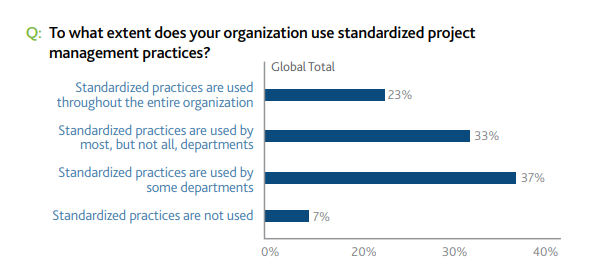Project Management Statistics for 2024

In a work environment where things don’t always go to plan, project management is a discipline that is needed now more than ever.
As new technologies and methodologies emerge, the project management institute (PMI) and other experts continuously update and revise their standards and certification exams.
Scrum is one of the most utilized project management methodologies around. The Scrum project management is a subset of the Agile Practice Guide, which uses time-boxed iterations, called sprints.
The use of project management software and tools helps organizations manage projects by providing a central location for all project documents, facilitating collaboration among team members, and tracking the progress of each project.
In this article, I have compiled the most recent statistics on the project management industry.
Project Management (PM) Productivity
As a practice, PM is 28 times more productive in organizations that employ it than those that don’t.
(CIO)
Organizations that employ PM techniques are 28% more likely to meet their target business objectives.
Poor project management planning leads to 11.4% of company resources being wasted.
(PMI)
Project managers need to plan for every possible outcome to optimize resource management and reduce costs.
The top three crucial factors for PM software success are ease of integration, use, and reliability. With that said, current solutions are not yet suitable to satisfy these factors, according to 73% of businesses.
(Hive)
Integrations, ease of use, and reliability are highlighted as the three crucial factors for PM software to be successful.
Project Management Priorities
A culture that puts project management at the top is crucial only to 46% of surveyed organizations.
(PMI)
Only 46% of organizations surveyed state that having a culture that puts the PM at the top is crucial.
23% – the number of organizations that use software meant for project management.
(Wellingtone)

(Image credit: https://www.workamajig.com)
It’s worrying that only 23% of organizations use software meant for project management.
As much as 67% of companies that say PM is not essential fail.
(PMI)
According to recent surveys, as much as 67% of all companies that say that project management is not needed end up failing.
Need for Project Management
52% – survey respondents that are somewhat unhappy with their current project management arrangements in their company.
(Wellingtone)
Those involved in the day-to-day management of software projects can face different challenges.
According to the latest survey results, 52% of survey respondents are somewhat unhappy with the current project management arrangements in their company.
As much as 33% of project management professionals didn’t have their organization’s (complete) blessing to invest in project management software.
(Hive)
According to the results of a recent survey, as much as 33% of project management professionals were faced with various objections when they first decided to invest in project management software.
Having the proper project management portfolio management is key to influencing key decision-makers, according to 80% of project managers.
(Axelos)
PM professionals must have a clear and understandable display of their work and the results obtained.
Project Management Market
As much as 44% of managers are not believers in project management software.
(Hive)
According to a survey conducted by Hive, as much as 44% of managers do not think that PM software is needed.
35% of project managers still use Microsoft Excel when planning the resources.
(Wellingtone)
According to the results of a recent survey, as much as 35% of project managers still use Microsoft Excel to plan the resources they might need for their tasks.
Project Management As A Career
There are 1,279,290 project managers in the United States.
(US Bureau of Labor Statistics)
A project manager earned slightly more than $66,000 per year in January 2021.
(Glassdoor)
A project manager earned slightly more than $66,000 per year in January 2021.
The average salary for a project manager in January 2021 was around 66,000 dollars.
Out of all the organizations that employ project managers, 61% provide a career roadmap, with 47% of these having a clearly defined and straightforward way to progress.
(PMI)
Professionals with project management certifications earn 22% more than those without.
(PMI)
Being a PMP (project management professional) is essential if you want to succeed within the field.
According to PMI, professionals with project management certifications earn 22% more than those that don’t have any qualifications.
When comparing 2020 to 2019, 6% more organizations had project managers as employees.
(Wellingtone)
What Does A Project Manager Do?
Project Implementation
The project manager is responsible for planning and managing a particular stage or task.
In addition, they need to make sure that the business’s values are upheld during the implementation process for this particular task or stage of the job.
Making Sure That Their Project Team Functions As A Coherent Unit
Project managers are responsible for planning and managing certain stages or tasks assigned to them within a project.
In addition, they need to make sure that the business’s values are upheld during the implementation process for this particular task or stage of the job.
Communicating With Team Members, Stakeholders, And Clients
Project performance is dependent on real-time communication between team members, stakeholders, and clients.
It is a project manager’s responsibility to ensure that this communication runs smoothly so as not to confuse or misinform anyone.
A lack of communication is one of the leading causes of project failure, and a good PM can make sure that nothing like this ever happens.
Ensuring Quality Standards
Bad project management is one where standards set for quality are not met or anything else that may affect the final work product goes wrong.
A PM needs to ensure that team members adhere to the proper quality control measures.
Planning projects in advance
Project management practices are closely tied to project planning.
A project manager needs to make sure that his project is planned out in advance according to the list of requirements set forth by a client or other parties involved and make sure it meets all quality standards while being completed within a specific time frame.
Keeping Track Of Resources
The project manager needs to make sure that resources necessary for completing a job or project are available and in sufficient supply to complete the task at hand within a specific time frame.
He needs to keep track of resources and update his team on such information when it changes.
Adhering To Deadlines
The project management software market is full of tools that help a project manager adhere to deadlines and other markers on the timeline of a given project.
A project manager also focuses on meeting with various groups related to the project to ensure that everything goes according to plan, keeping everyone in the loop.
He needs to make sure that all parties involved are happy with a given stage or process and that they are perfectly comfortable with his and his team’s project management techniques.
Managing Risk Management
Risk management is one of the more complex aspects of project management.
Risk management is often the most challenging aspect of any project and almost always requires time and effort from everyone involved.
Using the right project management software helps manage risks at any implementation stage.
Various Project Management Methodologies
Four of the most popular project management methodologies are:
- Waterfall methodology
- Agile methodology
- Scrum methodology
- Kanban methodology
Waterfall Methodology
As one of the original project management forms, the waterfall methodology still benefits today’s working environment.
One step is completed before another begins, and this process continues until the final stage of the project is complete.
Agile Methodology
The agile methodology is a highly flexible approach to project management. It allows a team to work together and make changes to improve a given aspect of a project.
Agile is a software development method that uses incremental development to create projects.
The agile project management methodology focuses on collaboration and self-organization to complete tasks and goals more efficiently and effectively than other implementation methods.
Scrum Methodology
Scrum project management is a widely used agile methodology and also takes its name from rugby, which is the sport that inspired its creation.
Scrum project management focuses on doing things right by emphasizing high-quality products created over a set time frame.
One of the critical features of the scrum project methodology is its focus on maximizing productivity by creating a team environment that allows for open discussions and the exchange of ideas among all involved.
Kanban Methodology
The Kanban project management approach focuses on visualizing tasks to ensure that everything runs smoothly and can be adjusted as necessary to accommodate changes in a project.
Conclusion
Project management is an area of expertise used in various industries.
Last Updated on 28 December 2023 by Tuomas Data
